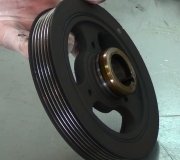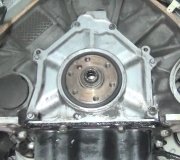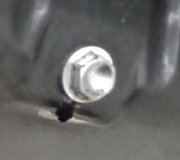If you order a hamburger, don't be angry if the waiter didn't recommend the steak. You have to understand you got what you paid for so while the mechanic may have failed to address the cause of the problem, you only paid half of what you should have been quoted to begin with. When there's metal chips in the oil pan, they're also throughout the entire engine. A total rebuild with a thorough cleaning are what was and is needed. I watched one coworker try to save another coworker money by doing this same repair, and it had the same result. The engine failed again within a few hundred miles. All it takes is one metal chip to get stuck in an oil passage and everything from that point on will starve for oil which is an engine's life blood.
Lack of oil pressure OR a metal chip circulating in an engine bearing will destroy that bearing in seconds. A torn-up bearing is what causes those chips in the first place, and here it sounds like it was due to lack of oil. To be sure you're clear, the oil warning light on the dash refers to oil pressure, not level. Of course the pressure will go down once the oil level gets low enough for the pump to suck up air. The second thing is oil pumps can fail, but they are very seldom the cause of low oil pressure. Low pressure is almost always the result of low oil level or worn bearings.
The first mistake was blaming the oil pump for metal chips in the oil. They don't create chips. If the mechanic saved the old bearings to be examined, you'd see they were very rough, chewed up, and multiple colors. There's typically three layers of metal, and you should only be able to see the top layer. It will be very smooth and shiny. Even if your father was right and the pump was bad, the result would be severe damage to all the engine parts that rely on that pressurized oil. It doesn't sound like that's what the mechanic suspected.
The second thing to consider is we don't know exactly what work was done and which parts were replaced. If the bearings were chewed up, the journals on the crankshaft were too and it would need to be replaced. For $1600.00, it's pretty likely that's what was done. At the mileage you listed the cylinder heads will typically be okay yet. Rebuilding them is part of a total rebuild, and a total rebuild commonly runs around $3000.00 to $3500.00. We also don't know if "rebuilding the lower end" included pistons and piston rings. Broken or worn piston rings can cause oil burning in the engine, and if that wasn't addressed, naturally the cause of the problem is still there.
Next, "About 2 weeks after the rebuild I noticed my oil light continuing to come on and that my car was burning oil way too fast". Do you mean the light was continuing to turn on after the rebuild but you didn't notice it for two weeks? Or do you mean the light stayed off for two weeks, then the problem started again? If the engine ran fine for two weeks, the mechanic must have done something right. It sounds like both incidences are due to loss of oil. You said the first problem started right after having the oil changed, and the second one occurred two weeks after the engine was repaired, but you never said how many miles that was. If your engine were to burn one quart of oil in 1,000 miles, you'd see blue smoke from the tail pipe because that would be pretty bad, but being one quart low isn't going to produce these catastrophic problems.
The next mistake is a big one. You're still trying to drive the car. The oil warning light turned on again. That means stop the engine immediately and coast to the side of the road. Severe engine damage is going to start taking place in a few seconds. You can't blame that on the mechanic. Typically the warning light will turn on when the pressure gets down to less than ten pounds. At that point oil is still circulating and damage to parts is not likely to occur instantly. That's why stopping the engine right away, then addressing the oil level problem, usually results in no permanent damage. What you have caused is a more severe version of the first problem. You're going to find the same metal chips in the oil pan caused by the bearings tearing apart, but this time they've gotten so chewed up that the "clearance" between rotating parts is big, and those parts are banging against each other. That's the loud noise you're hearing. That hammering action further increases the clearance, so the noise will get louder and louder until something breaks. Keeping those clearances very small is what holds the oil pressure up. So now you have a vicious circle. Lack of oil tears up the bearings. Damaged bearings have a bigger clearance. Increased clearance lets the pressurized oil run out faster than designed. With nothing to hold the oil in, pressure goes down. That low pressure affects all the other parts that rely on it for their survival.
If your engine was burning three or four quarts of oil in just a few hundred miles, there wouldn't be any mosquitoes in your entire county! There would be such a fog following your car that no one would be able to see you. That is not likely to be the case at this relatively low mileage. I suspect you have an oil leak that was not discovered by the mechanic, or the leakage only occurs at higher speeds when some of the oil can "pool" at the top of the engine and get pushed out through a leak. You should see evidence of that by black spots on the ground where you park, and oil on the engine.
Being a third party observer, I have way more questions than answers. Why did the engine run okay for two weeks? If there's no evidence of an oil leak, how can it be burning so fast in the engine and not be creating a huge blue cloud? How many miles does this cover, and how often do you check the oil level? How quickly were you losing oil before that oil change?
I'm skeptical that working on the cylinder heads / valves is the answer but I'm not there to listen to the noise. Valves can make noise but problems with them rarely cause low oil pressure. We still need to determine exactly where the oil is going. There are seals on the valves, but even if all of them failed, it would take hundreds of miles to go through all the oil in the engine, and you'd still be surrounded by blue smoke.
To find the source of an elusive leak, and to verify the engine is or is not burning the oil, you can add a small bottle of dark purple dye to the oil, then search a day later with a black light. The dye will show up as a bright yellow stain that you can follow back to the source. If the oil is being burned, you'll find the dye inside the tail pipe. Auto parts stores have the dye, and those that rent or borrow tools will usually have the black light.
Since I don't have all the answers, let me share how this would be handled at the shop I used to work for. Lets assume you needed a total rebuild the first time at a cost of $3200.00. The mechanic looked for the least expensive solution to save you money, as most will do, and he decided only half the job would be sufficient, at a cost of $1500.00. If he had reason to suspect the entire job was needed, he would never give you the lower-cost option. So in good faith, he does half the job. If it does not restore the engine to proper operation, he has to tell you more parts are needed, and we really hate having to do that. In this case the job turns out okay, and to show his confidence in his work, the shop gives you a warranty. Understand a warranty will always just cover what you paid for and nothing more.
Now the job has gone sour and no one is happy. All the mechanic's work and all the costs the shop incurred have to be repeated, but at no cost to you. This is where it can get confusing. NOW the mechanic sees that he should have gone further or done more the first time. You should have been charged for more work but you weren't. The typical way this would be handled is to start from scratch, determine everything that is needed, in this case $3200.00, then subtract the $1500.00 you already paid. That's a complicated way of saying you will only be charged for things you weren't charged for previously. Try to get that kind of generosity from a doctor or lawyer.
The shop owner also has to decide if the mechanic did anything wrong. The owner is going to pay for all the parts that you paid for already. If the mechanic made a serious mistake, he will be repeating the original work for free. If the mechanic followed proper procedures and something still went wrong, he will get paid to do the work over, but you won't be charged for it again.
Since the car has already been laid up for so long, a dandy option is to let the mechanic drive it for a couple of weeks after the repairs are done to be sure there are no more hidden problems and it's no longer using oil. Another option is to install a good used engine from a salvage yard, but I'd still want to know where the oil is going in this one. There's no point in going to a different engine if there's a chance it will develop the same problem.
Sunday, November 23rd, 2014 AT 10:42 PM


